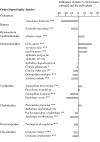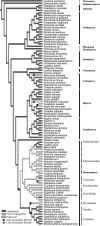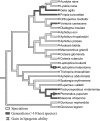Loss of lipid synthesis as an evolutionary consequence of a parasitic lifestyle
- PMID: 20421492
- PMCID: PMC2889307
- DOI: 10.1073/pnas.1001744107
Loss of lipid synthesis as an evolutionary consequence of a parasitic lifestyle
Abstract
Evolutionary loss of traits can result from negative selection on a specific phenotype, or if the trait is selectively neutral, because the phenotype associated with the trait has become redundant. Even essential traits may be lost, however, if the resulting phenotypic deficiencies can be compensated for by the environment or a symbiotic partner. Here we demonstrate that loss of an essential me-tabolic trait in parasitic wasps has evolved through environmental compensation. We tested 24 species for the ability to synthesize lipids de novo and collected additional data from the literature. We found the majority of adult parasitoid species to be incapable of synthesizing lipids, and phylogenetic analyses showed that the evolution of lack of lipogenesis is concurrent with that of parasitism in insects. Exploitive host manipulation, in which the host is forced to synthesize lipids to the benefit of the parasitoid, presumably facilitates loss of lipogenesis through environmental compensation. Lipogenesis re-evolved in a small number of parasitoid species, particularly host generalists. The wide range of host species in which generalists are able to develop may impede effective host manipulation and could have resulted in regaining of lipogenic ability in generalist parasitoids. As trait loss through environmental compensation is unnoticed at the phenotypic level, it may be more common than currently anticipated, especially in species involved in intricate symbiotic relationships with other species.
Conflict of interest statement
The authors declare no conflict of interest.
Figures


 ) and losses (
) and losses ( ) in parasitic lifestyle. Character tracing for lipogenic ability is shown, in which dark gray branches refer to an ability to accumulate lipids, whereas light gray branches refer to a lack of lipid accumulation in adults. In this phylogeny, Ichneumonoidea and Proctotrupomorpha are considered sister groups.
) in parasitic lifestyle. Character tracing for lipogenic ability is shown, in which dark gray branches refer to an ability to accumulate lipids, whereas light gray branches refer to a lack of lipid accumulation in adults. In this phylogeny, Ichneumonoidea and Proctotrupomorpha are considered sister groups.
 ) in lipogenic ability are shown. In this phylogeny, Ichneumonoidea and Proctotrupomorpha are regarded as sister groups.
) in lipogenic ability are shown. In this phylogeny, Ichneumonoidea and Proctotrupomorpha are regarded as sister groups.Similar articles
-
Phenotypic plasticity explains apparent reverse evolution of fat synthesis in parasitic wasps.Sci Rep. 2021 Apr 8;11(1):7751. doi: 10.1038/s41598-021-86736-8. Sci Rep. 2021. PMID: 33833245 Free PMC article.
-
Parasitic wasps do not lack lipogenesis.Proc Biol Sci. 2021 May 26;288(1951):20210548. doi: 10.1098/rspb.2021.0548. Epub 2021 May 26. Proc Biol Sci. 2021. PMID: 34034524 Free PMC article.
-
Gene expression changes associated with the evolutionary loss of a metabolic trait: lack of lipogenesis in parasitoids.BMC Genomics. 2019 Apr 23;20(1):309. doi: 10.1186/s12864-019-5673-6. BMC Genomics. 2019. PMID: 31014246 Free PMC article.
-
Lack of lipogenesis in parasitoids: a review of physiological mechanisms and evolutionary implications.J Insect Physiol. 2008 Sep;54(9):1315-22. doi: 10.1016/j.jinsphys.2008.07.014. Epub 2008 Jul 29. J Insect Physiol. 2008. PMID: 18706420 Review.
-
Resource acquisition, allocation, and utilization in parasitoid reproductive strategies.Annu Rev Entomol. 2008;53:361-85. doi: 10.1146/annurev.ento.53.103106.093433. Annu Rev Entomol. 2008. PMID: 17877453 Review.
Cited by
-
Metamorphosis-related changes in the free fatty acid profiles of Sarcophaga (Liopygia) argyrostoma (Robineau-Desvoidy, 1830).Sci Rep. 2020 Oct 15;10(1):17337. doi: 10.1038/s41598-020-74475-1. Sci Rep. 2020. PMID: 33060748 Free PMC article.
-
Limited effects of the maternal rearing environment on the behaviour and fitness of an insect herbivore and its natural enemy.PLoS One. 2019 Jan 11;14(1):e0209965. doi: 10.1371/journal.pone.0209965. eCollection 2019. PLoS One. 2019. PMID: 30633753 Free PMC article.
-
Variation in lipid synthesis, but genetic homogeneity, among Leptopilina parasitic wasp populations.Ecol Evol. 2018 Jun 27;8(15):7355-7364. doi: 10.1002/ece3.4265. eCollection 2018 Aug. Ecol Evol. 2018. PMID: 30151155 Free PMC article.
-
Pupal size as a proxy for fat content in laboratory-reared and field-collected Drosophila species.Sci Rep. 2022 Jul 27;12(1):12855. doi: 10.1038/s41598-022-15325-0. Sci Rep. 2022. PMID: 35896578 Free PMC article.
-
Lipidomics reveals how the endoparasitoid wasp Pteromalus puparum manipulates host energy stores for its young.Biochim Biophys Acta Mol Cell Biol Lipids. 2020 Sep;1865(9):158736. doi: 10.1016/j.bbalip.2020.158736. Epub 2020 May 11. Biochim Biophys Acta Mol Cell Biol Lipids. 2020. PMID: 32438058 Free PMC article.
References
-
- Fong DW, Kane TC, Culver DC. Vestigialization and loss of nonfunctional characters. Annu Rev Ecol Syst. 1995;26:249–268.
-
- Porter ML, Crandall KA. Lost along the way: The significance of evolution in reverse. Trends Ecol Evol. 2003;18:541–547.
-
- Lahti DC, et al. Relaxed selection in the wild. Trends Ecol Evol. 2009;24:487–496. - PubMed
-
- Poulson TL, White WB. Cave environment. Science. 1969;165:971–981. - PubMed
-
- Roff DA. The evolution of flightlessness: Is history important? Evol Ecol. 1994;8:639–657.
Publication types
MeSH terms
Substances
LinkOut - more resources
Full Text Sources
Other Literature Sources
Research Materials

